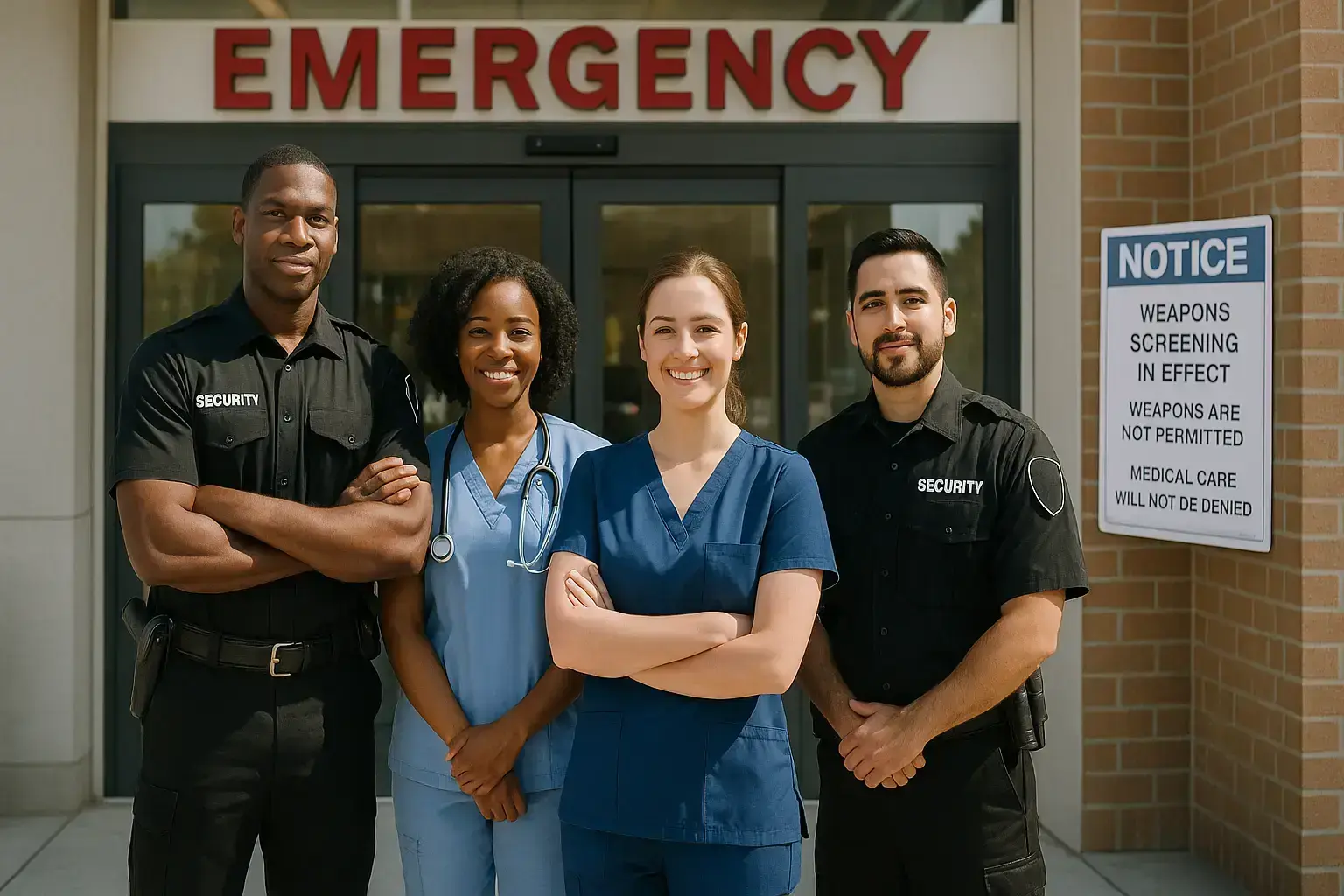What is CA Assembly Bill 2975?
Violence against healthcare workers and hospital shooting incidents have surged to alarming levels, and California lawmakers are responding. Assembly Bill 2975 (AB 2975), passed in California in 2024, amends the California Occupational Safety and Health Act of 1973 to strengthen workplace violence prevention standards for hospitals. It requires the Occupational Safety and Health Standards Board (Cal/OSHA) to adopt, by March 1, 2027, standards mandating hospitals to implement a weapons detection screening policy. This policy must include:
- Use of automatic weapons detection devices (not handheld metal detector wands) at specific entrances: the main public entrance, emergency department entrance, and labor and delivery entrance (if separate).
- Assignment of trained personnel to operate these devices.
- Reasonable protocols for alternative screening for those who refuse device screening.
- Procedures for responding to detected dangerous weapons.
- Post signs notifying the public about the screenings
The bill aims to protect healthcare workers and facility personnel from aggressive and violent behavior. It expands the scope of existing workplace safety regulations, and because it modifies provisions tied to criminal penalties, it imposes a state-mandated local program. However, no state reimbursement is required for local agencies, as the costs stem from changes to crime-related provisions under the California Constitution. The bill was introduced by Assemblymember Gipson, approved by the Governor on September 27, 2024, and chaptered as Statutes of 2024, Chapter 749
Healthcare Facilities Prioritize Action
It’s tempting to look at a 2027 compliance date and think there’s time to spare. There isn’t. Here’s why.
Equipment Availability
Hundreds of facilities statewide will all be sourcing weapons detection technology at roughly the same time. As the deadline approaches, vendors and manufacturers will be stretched thin, and shortages or delays are almost certain. Hospitals that delay risk coming up short when the rush hits.
Implementation Is Complex
Deploying new screening systems is only part of the challenge. Hospitals will also need to:
- Train security personnel (at least eight hours) in equipment operation, response planning, de-escalation, and implicit bias
- Draft and refine screening policies that protect dignity and privacy
- Build robust protocols to manage any weapons discovered
- Plan alternative screening processes for unusual situations
- Update their workplace violence prevention programs
Each of these steps takes time, input from multiple teams, and thorough testing to get it right.
Budget Planning
Technology upgrades of this scale rarely come cheap. Smart hospitals will fold these investments into upcoming budget cycles to avoid a last-minute scramble — or worse, a forced emergency spend.
How Omnilert Supports Safer Healthcare Environments
Omnilert’s technology lineup offers California hospitals a way to meet these new requirements while preserving their core mission of compassionate, patient-centered care.
Proactive Threat Awareness with Omnilert Gun Detect
Omnilert Gun Detect uses powerful AI to visually identify guns in real time, analyzing live video feeds and spotting visible firearms before a shooter can act. Hospitals can leverage existing security camera systems with AI Gun Detection, giving them a fast, proactive layer of defense that complements traditional entry screening and adds an early-warning capability where seconds can truly save lives.
Beyond Detection: Complete Active Shooter Readiness
Omnilert goes even further with its Active Shooter Solution. Think of it as an all-in-one emergency management hub, combining gun detection, verified video alerts, automated lockdown workflows, and coordinated law enforcement communications. Hospitals gain a holistic, integrated solution for worst-case scenarios, with proven tools to protect patients, staff, and visitors from harm.
Protecting Patients and Staff Without Disrupting Care
The mission of AB 2975 is crystal clear: protect those who heal us. But strict security measures can’t be allowed to harm a hospital’s welcoming and caring environment. With thoughtful design and modern technology, they don’t have to.
Omnilert’s proactive, AI-driven safety ecosystem empowers hospitals to comply with California’s new requirements while preserving the essential spirit of healthcare — open, compassionate, and focused on healing.
2027 will be here before you know it. By starting now, your organization can plan budgets, train staff, and implement hospital security system measures that truly work, without the panic of a last-minute rush. Let Omnilert’s security experts help you get ahead of the curve. Visit omnilert.com to learn more and schedule a conversation.



